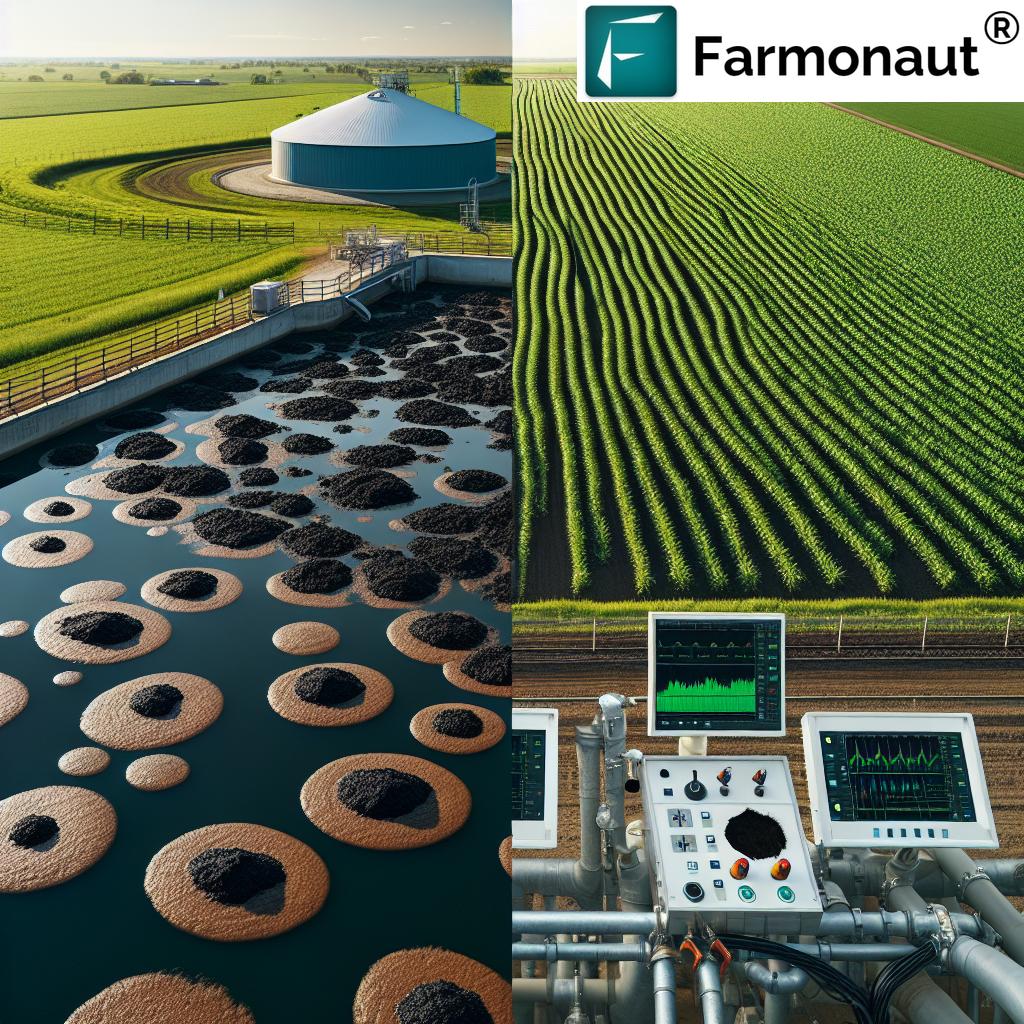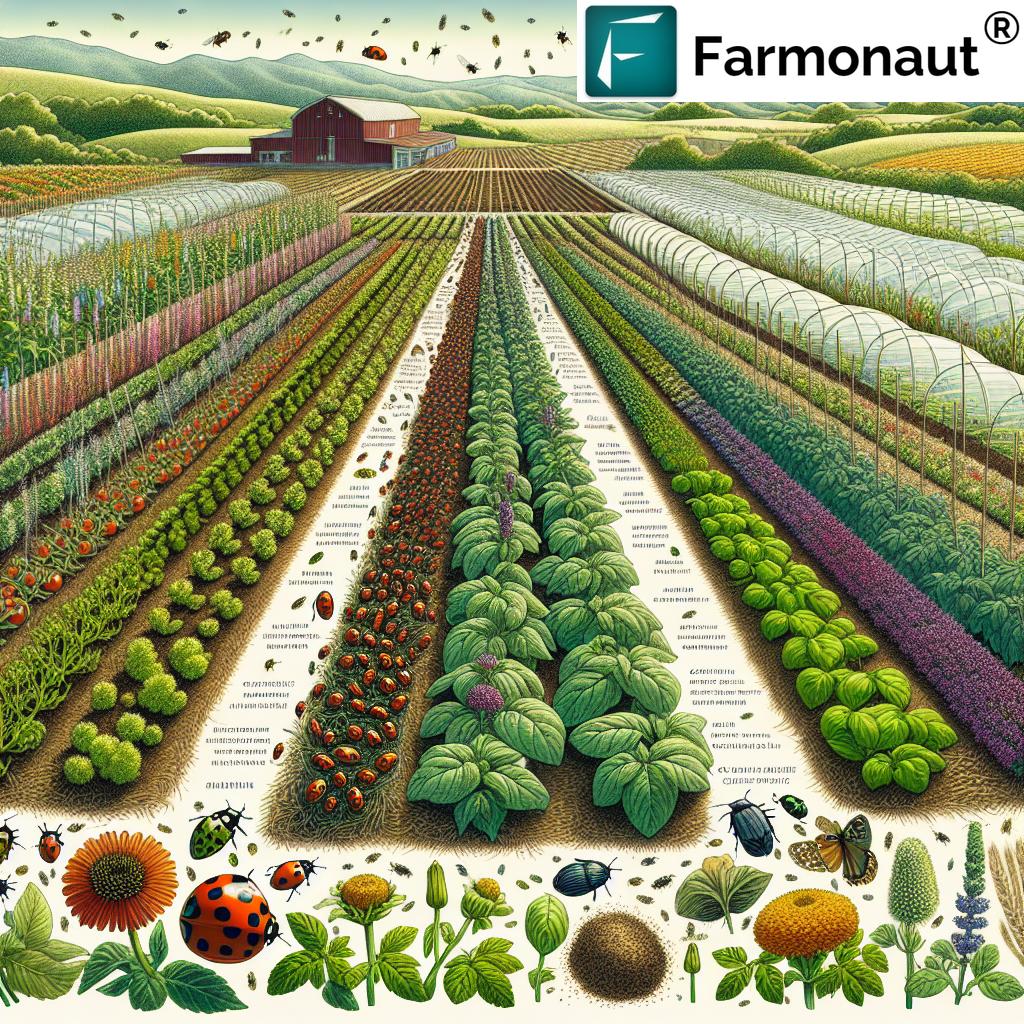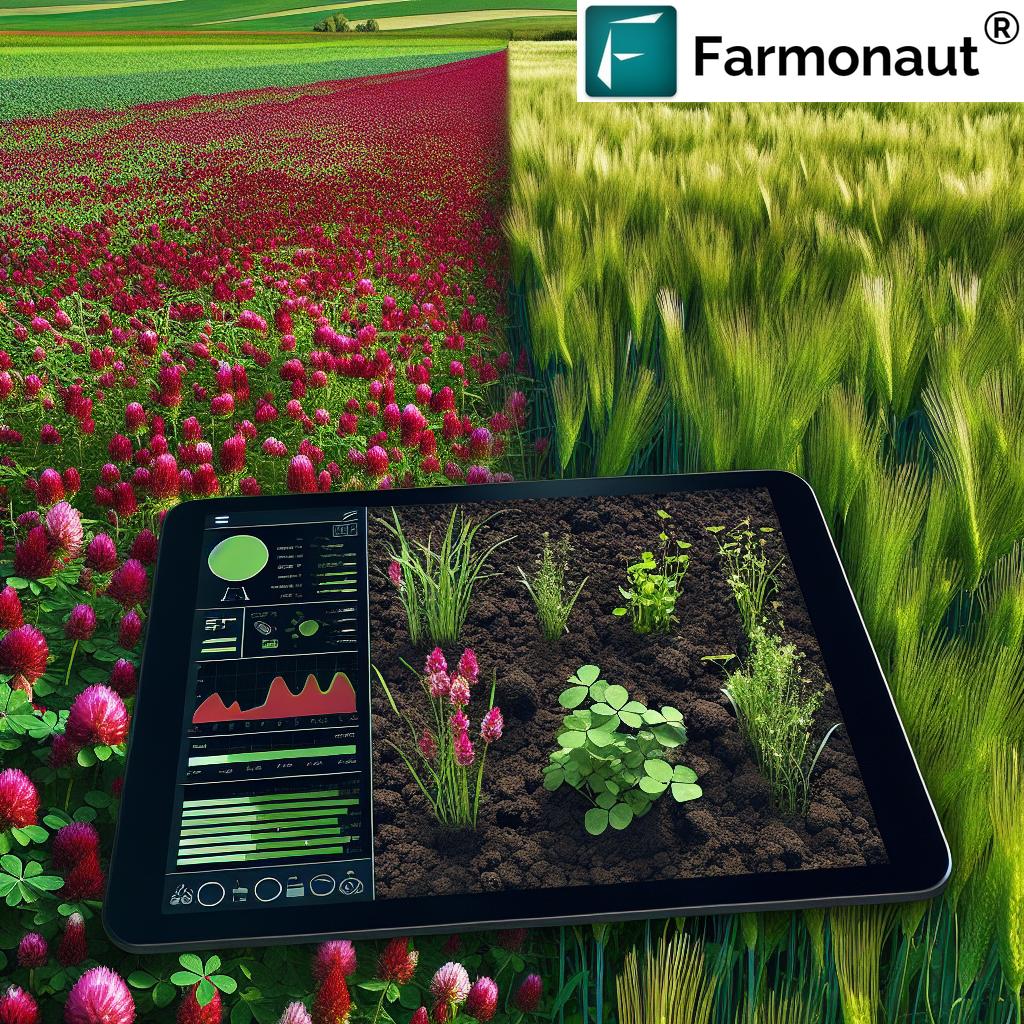Revolutionizing Sustainable Agriculture: Biochar’s Innovative Role in Manure Management and Environmental Conservation
“Biochar can reduce ammonia emissions from livestock waste by up to 80%, significantly improving air quality on farms.”
In the ever-evolving landscape of sustainable agriculture practices, we at Farmonaut are excited to explore groundbreaking solutions that address some of the most pressing challenges faced by farmers and the environment. Today, we’re delving into the innovative world of biochar and its remarkable potential in revolutionizing manure management and environmental conservation.

As pioneers in agricultural technology, we understand the importance of integrating cutting-edge solutions with traditional farming methods. Our satellite-based farm management solutions, accessible through our web app, Android app, and iOS app, are designed to empower farmers with real-time data and insights. Now, let’s explore how biochar is set to transform sustainable agriculture, particularly in the realm of manure management.
Understanding Biochar: Nature’s Carbon Sponge
Biochar is a fascinating material that’s been gaining attention in agronomic research circles. But what exactly is it? Biochar is essentially charcoal produced from plant matter through a process called pyrolysis. This process involves heating organic material in the absence of oxygen, resulting in a stable, carbon-rich substance that can persist in soil for hundreds to thousands of years.
- Biochar is highly porous, giving it an enormous surface area
- It has the ability to retain water and nutrients
- Biochar can sequester carbon in soils, contributing to climate change mitigation
The unique properties of biochar make it an excellent candidate for addressing various environmental challenges in agriculture, particularly in manure management.
The Manure Management Challenge
Livestock waste management has long been a significant concern for farmers, especially those running dairy or large-scale animal operations. Traditional methods of manure storage and disposal often lead to several environmental issues:
- Nutrient runoff into water bodies, causing eutrophication
- Emission of greenhouse gases, particularly methane and ammonia
- Odor problems affecting local communities
- Soil contamination if not properly managed
These challenges call for innovative solutions that can address multiple issues simultaneously. This is where biochar enters the picture, offering a promising approach to sustainable manure management.
Biochar as a Game-Changer in Manure Management
Recent research has highlighted biochar’s potential as a superior alternative to traditional manure management methods. Let’s explore some of the key benefits:
1. Nutrient Runoff Prevention
One of the most significant advantages of using biochar in manure management is its ability to prevent nutrient runoff. When added to manure or used as a cover for manure lagoons, biochar acts like a sponge, absorbing and retaining nutrients such as nitrogen, phosphorus, and potassium. This retention prevents these valuable nutrients from leaching into groundwater or running off into surface water bodies.
2. Reducing Ammonia Emissions
Ammonia emissions from livestock waste are a major environmental concern. They contribute to air pollution and can be harmful to both human and animal health. Biochar has shown remarkable efficiency in reducing ammonia emissions, with studies indicating reductions of up to 80% compared to untreated manure.
3. Odor Control
The porous nature of biochar makes it an excellent odor absorbent. When used as a cover for manure lagoons or mixed with manure, biochar significantly reduces the emission of odorous compounds, improving air quality around farm areas.
4. Soil Fertility Improvement
When biochar-treated manure is applied to agricultural fields, it not only provides nutrients but also improves soil structure and fertility. Biochar enhances soil water retention, increases cation exchange capacity, and provides a habitat for beneficial soil microorganisms.
Biochar vs. Traditional Methods: A Comparative Analysis
To better understand the advantages of biochar over traditional manure management methods, let’s look at a comparative analysis:
| Criteria | Biochar Performance | Traditional Method (e.g., Straw) | Environmental Impact | Cost-Effectiveness |
|---|---|---|---|---|
| Odor Reduction Efficiency | High (>70%) | Moderate (30-50%) | Significantly Positive | High |
| Nutrient Runoff Prevention | Excellent (>90% retention) | Fair (40-60% retention) | Highly Positive | High |
| Ammonia Emission Reduction | Up to 80% | 20-40% | Significantly Positive | High |
| Carbon Sequestration Potential | High | Low | Highly Positive | Moderate |
| Soil Fertility Improvement | Significant Long-term Benefits | Short-term Benefits | Positive | High |
| On-site Production Feasibility | Possible with Proper Equipment | Readily Available | Positive (if produced sustainably) | Moderate |
| Long-term Environmental Benefits | Substantial | Limited | Highly Positive | High |
This comparison clearly illustrates the superior performance of biochar across various aspects of manure management, particularly in terms of environmental impact and long-term benefits.
Implementing Biochar in Farm Management
Integrating biochar into farm management practices requires careful planning and consideration. Here are some key points to consider:
- Production: Biochar can be produced on-site using farm waste, creating a sustainable closed-loop system.
- Application: Biochar can be mixed directly with manure, used as a lagoon cover, or applied to fields along with manure.
- Dosage: The optimal amount of biochar depends on factors such as soil type, crop needs, and specific management goals.
- Monitoring: Regular soil testing and crop monitoring are essential to assess the effects of biochar application.
At Farmonaut, our advanced satellite-based monitoring systems can help farmers track the impact of biochar application on crop health and soil conditions. Our API and developer documentation provide tools for integrating this data into farm management systems.

“On-site biochar production utilizes farm waste for energy generation, creating a sustainable closed-loop system for agricultural operations.”
Environmental and Economic Benefits of Biochar
The adoption of biochar in manure management offers a range of environmental and economic benefits:
Environmental Benefits:
- Reduced greenhouse gas emissions from manure storage and application
- Improved water quality due to decreased nutrient runoff
- Enhanced soil health and biodiversity
- Carbon sequestration, contributing to climate change mitigation
Economic Benefits:
- Reduced costs associated with traditional manure management methods
- Potential for increased crop yields due to improved soil fertility
- Possible income from carbon credits through carbon sequestration
- Reduced need for synthetic fertilizers, leading to cost savings
The Future of Biochar in Sustainable Agriculture
As we look to the future, the potential applications of biochar in sustainable agriculture continue to expand. Ongoing research is exploring new areas where biochar can make a significant impact:
- Precision Agriculture: Integrating biochar use with precision farming techniques for optimized application.
- Climate-Smart Agriculture: Utilizing biochar as a tool in climate adaptation strategies for agriculture.
- Circular Economy in Farming: Developing closed-loop systems where farm waste is converted to biochar and reused on-site.
- Water Conservation: Exploring biochar’s potential in improving water retention in soils, particularly in drought-prone areas.
At Farmonaut, we’re excited about the possibilities that biochar brings to sustainable agriculture. Our satellite-based monitoring systems can play a crucial role in tracking the effects of biochar application on crop health, soil moisture, and overall farm productivity.
Challenges and Considerations
While the benefits of biochar in manure management are significant, there are some challenges to consider:
- Production Costs: Initial investment in biochar production equipment can be high.
- Standardization: The quality of biochar can vary depending on production methods and feedstock.
- Application Rates: Determining optimal application rates for different soil types and crops requires ongoing research.
- Regulatory Framework: The use of biochar in agriculture may need to align with existing regulations on soil amendments and waste management.
These challenges highlight the need for continued research and development in the field of biochar application in agriculture.
Biochar and Climate Change Mitigation
One of the most exciting aspects of biochar is its potential role in mitigating climate change. Here’s how biochar contributes to this global challenge:
- Carbon Sequestration: Biochar can store carbon in a stable form for hundreds to thousands of years.
- Reduced Emissions: By improving manure management, biochar helps reduce methane and nitrous oxide emissions from livestock operations.
- Improved Soil Health: Healthier soils enhanced by biochar can capture and store more atmospheric carbon.
- Reduced Fertilizer Use: By improving nutrient retention, biochar can reduce the need for synthetic fertilizers, whose production is energy-intensive.
These climate-related benefits make biochar an attractive option for farmers looking to reduce their carbon footprint and contribute to global climate goals.
Biochar in Different Agricultural Systems
The application of biochar can be tailored to various agricultural systems:
1. Dairy Farming
In dairy operations, biochar can be used to manage manure lagoons, reducing odor and ammonia emissions while preserving nutrients for later use as fertilizer.
2. Crop Farming
For crop farmers, biochar can be incorporated into the soil to improve fertility, water retention, and overall soil health. This is particularly beneficial in areas with poor soil quality.
3. Organic Farming
Biochar aligns well with organic farming principles, offering a natural way to improve soil health and manage nutrients without synthetic inputs.
4. Greenhouse Horticulture
In controlled environments like greenhouses, biochar can be used as a soil amendment to improve growing media and manage nutrient levels more effectively.
The Role of Technology in Biochar Implementation
As we at Farmonaut focus on bringing advanced technology to agriculture, we see several ways in which our tools can support the implementation of biochar:
- Satellite Monitoring: Our satellite-based crop health monitoring can track changes in vegetation health (NDVI) following biochar application.
- AI Advisory: Our Jeevn AI system can incorporate biochar-related data to provide tailored advice on application rates and timing.
- Data Analytics: By analyzing historical and real-time data, we can help farmers optimize their biochar use for maximum benefit.
- Integration with Precision Agriculture: Our tools can help in the precise application of biochar-enriched manure, ensuring optimal distribution across fields.
These technological applications can significantly enhance the effectiveness of biochar use in sustainable agriculture.
Biochar Research and Development
The field of biochar research is rapidly evolving, with new discoveries and applications emerging regularly. Some areas of current research include:
- Optimizing biochar production methods for specific agricultural needs
- Studying long-term effects of biochar on soil microbial communities
- Investigating biochar’s potential in remediating contaminated soils
- Developing biochar-based fertilizers for enhanced nutrient delivery
- Exploring biochar’s role in improving livestock health when used as a feed additive
As research progresses, we expect to see even more innovative applications of biochar in sustainable agriculture.
Conclusion: A Step Towards Sustainable Agriculture
Biochar represents a significant leap forward in our quest for more sustainable agricultural practices. Its potential to revolutionize manure management, improve soil health, reduce environmental impact, and contribute to climate change mitigation makes it a powerful tool in the modern farmer’s arsenal.
At Farmonaut, we’re committed to supporting farmers in adopting innovative solutions like biochar. Our advanced satellite-based monitoring and AI-driven advisory systems are designed to work hand-in-hand with these new agricultural practices, helping farmers make informed decisions and optimize their operations.
As we continue to face global challenges in food production and environmental conservation, solutions like biochar offer hope for a more sustainable and productive agricultural future. By embracing these innovations and combining them with cutting-edge technology, we can work towards a world where agriculture not only feeds the planet but also helps heal it.
FAQ Section
Q: What is biochar, and how is it produced?
A: Biochar is a type of charcoal produced by heating organic matter (like wood or crop residues) in a low-oxygen environment through a process called pyrolysis. This results in a stable, carbon-rich material that can persist in soil for hundreds to thousands of years.
Q: How does biochar help in manure management?
A: Biochar helps in manure management by reducing odor, preventing nutrient runoff, decreasing ammonia emissions, and improving the overall quality of manure as a fertilizer. It acts as a sponge, absorbing and retaining nutrients and reducing the environmental impact of livestock waste.
Q: Can biochar improve soil fertility?
A: Yes, biochar can significantly improve soil fertility. It enhances soil structure, increases water retention, improves nutrient holding capacity, and provides a habitat for beneficial soil microorganisms. This leads to better overall soil health and potentially increased crop yields.
Q: How does biochar contribute to climate change mitigation?
A: Biochar contributes to climate change mitigation in several ways: it sequesters carbon in a stable form for long periods, reduces greenhouse gas emissions from manure, improves soil health (which can increase carbon storage in soil), and can reduce the need for synthetic fertilizers, whose production is energy-intensive.
Q: Is biochar suitable for all types of farming?
A: While biochar has broad applications, its suitability can vary depending on specific farming conditions, soil types, and management goals. It’s particularly beneficial in areas with poor soil quality, high rainfall (where nutrient leaching is a concern), or in intensive livestock operations. It’s always best to consult with agricultural experts or conduct small-scale trials before large-scale implementation.
As we continue to explore the potential of biochar in sustainable agriculture, Farmonaut remains committed to providing farmers with the tools and insights they need to make informed decisions. Our satellite-based monitoring systems, AI-driven advisory services, and data analytics capabilities are here to support farmers in implementing innovative solutions like biochar effectively.
For more information on how Farmonaut can help you optimize your farming practices, including the integration of sustainable solutions like biochar, visit our website or download our app today. Together, we can build a more sustainable and productive future for agriculture.
















